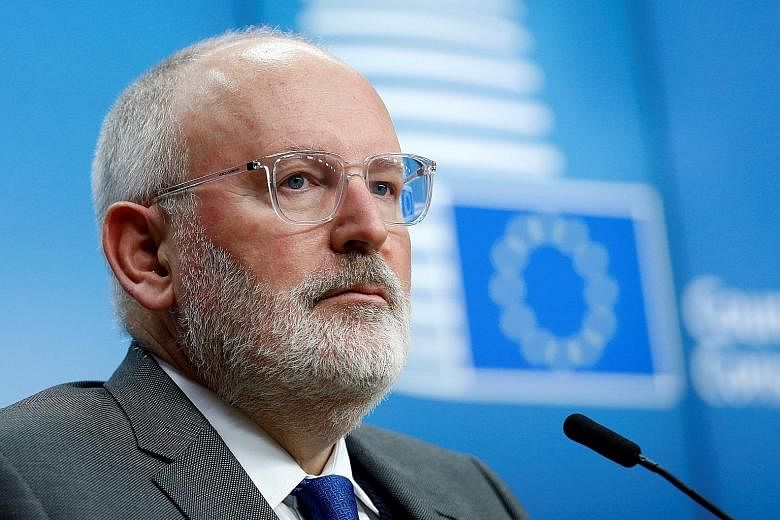BRUSSELS • European Union leaders suspended a summit yesterday after 20 hours of talks failed to produce a deal on who should get the bloc's top jobs, prompting anger from French President Emmanuel Macron, who said Europe's indecision was hurting its image abroad.
Their inability to find consensus candidates during marathon negotiations that ran through the night reflected the fragmented state of the bloc's Parliament, and underlined the problems in reaching a common position on issues from migration to climate change that have grown as the bloc has expanded.
Mr Macron, who left the venue shortly after the talks were abruptly called off to be convened again today, labelled the breakdown a "failure", though he said an agreement could still be found.
Eastern European countries had strongly objected to a deal hatched by Mr Macron and the leaders of Germany and Spain to hand the European Commission (EC) presidency to Dutch socialist Frans Timmermans. Under that plan, a liberal candidate would also succeed Mr Donald Tusk as president of the European Council of national leaders.
Mr Timmermans' nomination was also deeply unpopular with the centre-right European People's Party (PEP), which argued that it should hold the EC presidency as it has the most lawmakers in Parliament.
Mr Macron said there could be no further enlargement of the bloc without reforms that permitted it to function.
The post of EC president was just one of five, which includes president of the European Central Bank, that need allocating. It is highly unusual for summit talks to run into a third day, and the current negotiations mark what is already the third attempt to fill the posts for at least the next five years.
Asked what was the main sticking point, an EU official said: "The whole package." Dutch Prime Minister Mark Rutte said: "It's just unbelievably complicated. You have so many political factions." He added that some factions remain divided among themselves.
German Chancellor Angela Merkel, whose Christian Democratic Union belongs to the PEP, was more conciliatory towards the Eastern European nations, saying larger members could not ignore the views of smaller nations.
To be appointed, the next EC president needs the support of at least 72 per cent of the 28 member states, which must represent at least 65 per cent of the bloc's population.
Diplomats said getting names agreed was crucial for the EU's standing, as more delays would only provide fodder for anti-establishment nationalists who say the bloc is out of touch with its citizens, divided and dysfunctional.
REUTERS

